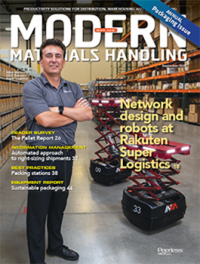New pallet design trims costs and extends useful life
Berry Plastics employs unique plastic pallet out of its own post molded scrap material.
It isn’t often that a company’s own production scrap is part of the solution for its packaging woes. But that’s exactly what happened at Berry Plastics, a division of Berry Global Group.
The company makes packaging used by consumers and industrial companies alike. Its products range from containers and tubes to plastic films, tapes, cups and even straws.
That said, the company became concerned about the wooden pallets used to ship its plastic packaging products. More specifically, Berry wanted to extend the number of times a pallet could be used to reduce costs. In addition, the heavy wood pallets caused ergonomic and safety issues such as splinters, wood shards and loose nails at the plant. There were also issues with mold, mildew, germs and infestation.
“Cost was the emphasis and all of the other challenges would be a win-win for all of us,” says David Flynn, director of procurement at Berry Plastics. In the end, Berry accomplished everything it originally hoped to achieve.
Getting there, however, was not a simple matter of changing to another pallet design. Instead, Berry worked with a supplier (Paradigm Plastic Pallets) to test several different types of post-molded materials for a unique plastic pallet.
Ideally, Berry wanted to include scrap material from its own processing rather than selling it on the open market. The challenge was to find a blend of post molded scrap that would be a favorable match in the extruding of the plastic boards used to make the pallets.
“By creating a manufacturing process that could use our scrap material, we eliminate the need to sell product on the open market at reduced value,” explains Flynn. In addition, the use of scrap resin is more economical than virgin resin.
The ability to take excess plastic from Berry’s production lines and turn it into a strong, durable, sustainable pallet that exceeds their requirements is considered a notable achievement.
In addition, the pallet design is partially hollow, delivering a better strength-to-weight ratio compared to wood and other plastic alternatives.
Primary use today is to store and transport work-in-process materials such as unprinted drink cups and containers. The new pallet significantly reduces the cost per compared to wooden pallets, turning more than 20 times compared to single digits for the wooden pallets previously used.
Total pallet expenses have been flat during the past year although pallet production and use requirements increased substantially. The company also enjoys the 100% reusable and recyclable attributes of the new pallet.
There are additional advantages to the switch, too. The strength of the pallet exceeds that of previous designs, increasing overall pallet weight capacity. Wear and tear resistance is also higher as the rugged pallet moves loads through the production process. Additionally, safety is enhanced.

Article Topics
Columns News & Resources
New resource center for weighing and dimensioning Protective packaging roundup MODEX C-Suite Q&A: Troy Donnelly, Senior VP of Sales, Marketing, and Application, DMW&H When Just-in-Time Just Doesn’t Work Recycling coastline plastic into premium reusable packaging Fresh food, anyone? RPCs protect in the supply chain Why Isn’t Your Loading Dock Connected to Your Supply Chain? More ColumnsLatest in Materials Handling
Geek+ and System Teknik deploy PopPick solution for pharmacy group Med24.dk Beckhoff USA opens new office in Austin, Texas Manhattan Associates selects TeamViewer as partner for warehouse vision picking ASME Foundation wins grant for technical workforce development The (Not So) Secret Weapons: How Key Cabinets and Asset Management Lockers Are Changing Supply Chain Operations MODEX C-Suite Interview with Harold Vanasse: The perfect blend of automation and sustainability Consultant and industry leader John M. Hill passes on at age 86 More Materials HandlingSubscribe to Materials Handling Magazine

Find out what the world's most innovative companies are doing to improve productivity in their plants and distribution centers.
Start your FREE subscription today.
April 2024 Modern Materials Handling

Latest Resources












